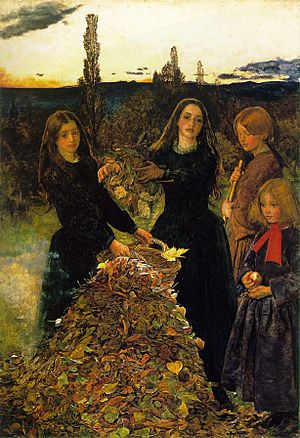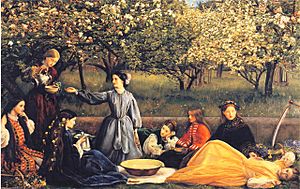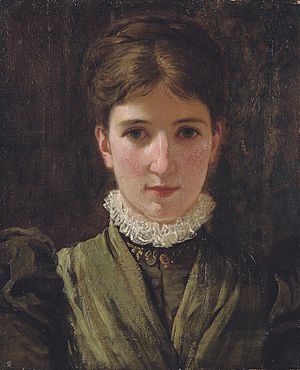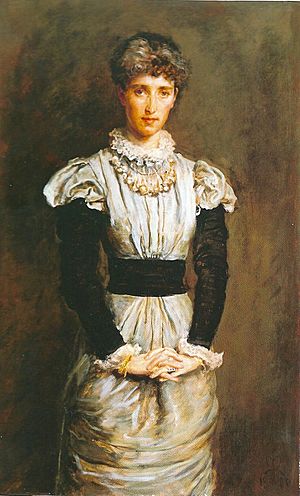Sophie Gray facts for kids
Quick facts for kids
Sophie Gray
|
|
|---|---|
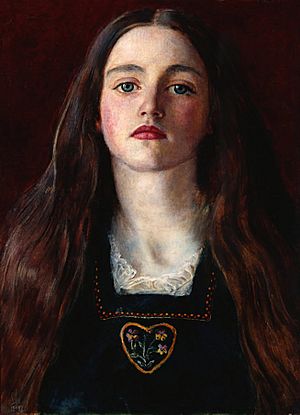
Portrait of a Young Lady, Millais's 1857 painting of Sophie Gray
|
|
| Born |
Sophia Margaret Gray
28 October 1843 |
| Died | 15 March 1882 (aged 38) |
| Nationality | British |
| Known for | Model for the pre-Raphaelite painter John Everett Millais |
| Spouse(s) | James Caird |
| Children | 1 |
| Relatives | Effie Gray (sister) |
Sophia Margaret "Sophie" Gray (born October 28, 1843 – died March 15, 1882) was a Scottish model. She was known for posing for her brother-in-law, the famous Pre-Raphaelite painter John Everett Millais. Sophie was the younger sister of Effie Gray, who married Millais in 1855. Effie's first marriage to John Ruskin had ended before this. Sophie's name was sometimes spelled "Sophy" by her family, but publicly she was known as Sophie. Later, after she married, she was called Sophia.
From the late 1860s, Sophie struggled with a serious health condition that affected her eating. In 1873, she married James Key Caird, a Scottish businessman. They had one daughter together. Sophie passed away in 1882, likely due to her health struggles.
Contents
Sophie Gray's Early Life
Sophie Gray was born in October 1843. Her parents were Sophia Margaret Jameson and George Gray. Her father was a lawyer and businessman from Scotland. Sophie was one of fifteen children in her family. Her older sister, Effie Gray, was fifteen years older than Sophie.
The Gray family lived in a house called Bowerswell. It was rebuilt in 1842 near Perth. As a child, Sophie often visited her sister Effie in London. Effie was married to the critic and artist John Ruskin at the time. Effie often acted like a second mother to Sophie and her other younger siblings.
Effie's Marriage and New Beginnings
In April 1854, Effie left her husband, John Ruskin. She said she was going to visit her parents in Scotland. Sophie had been staying with the Ruskins since late 1853. It seems she helped her sister leave. Sophie and Effie traveled by train from King's Cross station.
Sophie got off the train at Hitchin, where her parents were waiting. Her mother took Sophie's place on the train to Edinburgh. Sophie and her father went back to London. They delivered a package from Effie to her lawyers. The next day, Ruskin received papers ending his marriage. Sophie and her father then returned to Scotland.
Effie's marriage was officially ended in July 1854. The summer before, Effie, Ruskin, and the artist John Everett Millais had spent time in the Scottish Highlands. During this trip, Effie and Millais became very close. In early 1854, Millais painted a portrait of Sophie for her parents.
After her marriage ended, Effie avoided Millais for a while. But he stayed in touch with her mother. Effie and Sophie spent much of that summer in St Andrews with their younger sister, Alice. Effie, who was well-educated, taught her sisters during this time. The next year, Millais came to Bowerswell, and he and Effie were married in June 1855.
Sophie as a Model for Millais
For several years, Sophie continued to pose for Millais. An art historian named Suzanne Fagence Cooper wrote about Sophie's life. She said that Sophie "changes before our eyes from a child to a stunning teenager" in Millais's paintings.
You can see this change in three of Millais's works:
- Autumn Leaves (1855–56)
- Spring (also called Apple Blossoms) (1856–1859)
- A striking portrait of her at age 13, called Portrait of a Young Lady or simply Sophie Gray (1857)
Another artist, Charles Edward Perugini, also painted a portrait of Sophie as a young woman. The exact date is not known.
Paintings: Autumn Leaves and Spring
In Autumn Leaves, Sophie is one of four girls standing by a bonfire of leaves. Her sister Alice is also in this painting. Sophie is the only one of the four who looks like she is becoming a young woman.
In the later painting Spring, eight girls are relaxing in an orchard. Sophie is shown from the side, wearing a colorful, striped robe. She has long, flowing hair.
Later Artworks Featuring Sophie
Unlike Millais's 1854 portrait of Sophie, his later works were not kept by the family. The painting Sophie Gray (1857) was sold to George Price Boyce. He was a friend of Dante Gabriel Rossetti, another Pre-Raphaelite artist.
In 2012, Autumn Leaves and Sophie Gray were shown together. This was part of a big exhibition at Tate Britain called Pre-Raphaelites: Victorian Avant-Garde.
Sophie's Health and Marriage
In 1868, Sophie became unwell. Letters from that time show she was struggling with a serious health condition related to eating. She also became very restless and focused on music, especially playing the piano. Sometimes, her speech was hard to understand. In March 1869, Millais wrote that Sophie had been ill for a whole year.
Millais arranged for Sophie to be cared for by Thomas Harrington Tuke. He was a leading doctor who specialized in mental health. Sophie lived with the family of one of Tuke's colleagues. Later, she moved to lodgings in Hammersmith and then back to Bowerswell. Her health improved at times, but it remained a concern for the rest of her life.
Marriage to James Caird
On July 16, 1873, Sophie married James Key Caird. He was a businessman from Dundee who made jute products. He had been trying to marry her for several years. Sophie's family did not like James Caird. They thought he was dishonest. They also remembered Effie's difficult first marriage. However, they did not try too hard to stop the wedding. They worried it might make Sophie's health worse.
Sophie and James had one child, a daughter named Beatrix Ada, born in 1874. James was often away when Sophie needed him most. This made her family dislike him even more. In 1875, he stopped Sophie from visiting Effie on her way to France. It seemed he was often uncaring towards her, especially as his business grew.
Sophie's Final Years
In her last years, Sophie spent a lot of time alone with Beatrix. They mostly lived between Dundee and Paris. In 1880, Millais painted a final portrait of Sophie. This painting was shown at the new Grosvenor Gallery. It hung in Effie and John Everett Millais's home in London and is still owned by the family.
By the 1880s, Sophie had become very thin. Her Victorian clothing often hid this from others. In 1882, she returned to Dr. Tuke's care. She passed away on March 15, 1882, at the age of 38. Dr. Tuke said the cause of death was exhaustion and a "nervous system atrophy" that had lasted 17 years.
Millais painted a beautiful portrait of Sophie's daughter, Beatrix Caird, in 1879. Sadly, Beatrix died in 1888 at age 13. James Caird later used his wealth to support Ernest Shackleton's Imperial Trans-Antarctic Expedition (1914–1917). He also gave a lot of money to the city of Dundee. He became a baronet in 1913.
Sophie Gray in Popular Culture
In the film Effie Gray, which was finished in 2013, Sophie is played by Polly Dartford. Effie Gray is played by Dakota Fanning.
 | Laphonza Butler |
 | Daisy Bates |
 | Elizabeth Piper Ensley |


